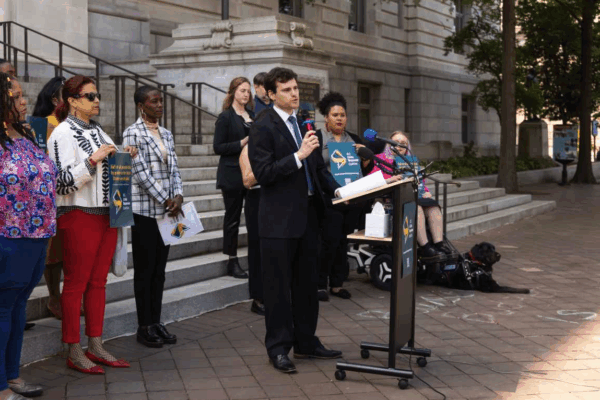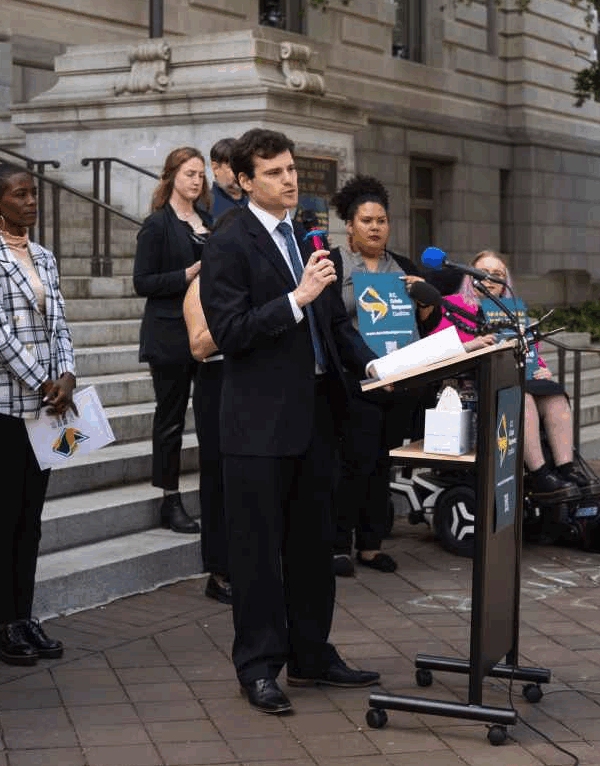Court Cases
All Cases
55 Court Cases
Jul 25, 2025

Martin v. United States – Fighting to preserve federal officer accountability for constitutional violations
Jun 03, 2025

Kingdom v. Trump – Challenging Denial of Gender Affirming Care to Incarcerated People with Gender Dysphoria
Mar 18, 2025

Martin v. United States – fighting to preserve federal officer accountability for constitutional violations
Curtrina Martin and her partner were injured and terrorized during a violent pre-dawn FBI raid on their suburban Atlanta home in 2017, all because the FBI agents went to the wrong address. Fifty years ago, in response to similar wrong-house raids, Congress enacted the "law-enforcement proviso" in the Federal Tort Claims Act (“FTCA”). That provision, which enables people to sue the government for "assault, battery, false imprisonment, false arrest, abuse of process, or malicious prosecution" by "investigative or law enforcement officers of the United States Government," ensures that people like Ms. Martin have can go to court to seek a remedy for the harms the government inflicted on them.
After the trial and appellate courts held that Ms. Martin's case could not proceed, the Supreme Court agreed to review it to consider the proper reading of the "law-enforcement proviso," which is a critical tool for holding the federal government accountable when federal officers injure people through unconstitutional physical force or arrests.
Together with the National ACLU, the ACLU of Georgia, Public Accountability, and the Cato Institute, we filed an amicus brief to argue that "law-enforcement proviso" claims cannot be defeated by the government's argument that officials were acting in an area in which they had "discretion." We explain why the government's argument fails both as a matter of statutory interpretation and because the government never has "discretion" to commit a constitutional violation. Further, we argue that the Court should not accept the government's proposal to import into the FTCA a version of "qualified immunity" — the problematic rule (which we have opposed in a number of other cases) that officers' actions cannot result in liability unless their actions were not just unconstitutional but in violation of "clearly established" law. This unnecessarily high barrier to holding officials accountable dilutes the force of constitutional rights and has no basis in text, history, or policy.
Mar 10, 2025

Kingdom v. Trump – Challenging Denial of Gender Affirming Care to Incarcerated People with Gender Dysphoria
This case concerns a ban on life-saving medical treatment for incarcerated people with gender dysphoria.
Gender dysphoria arises when someone experiences clinically significant distress based on an incongruence between their gender identity (that is, their internal sense of gender) and sex designated at birth. Everyone has a gender identity; however, for some people, it does align with their sex assigned at birth. That, in and of itself, is not a health disorder. Gender dysphoria arises when people experience clinically significant distress from the incongruence. If untreated, gender dysphoria can result in severe anxiety and depression, self-harm, and suicidality.
The widely approved treatment for gender dysphoria resolves the distress by enabling individuals to live consistently with their gender identity. That can involve social transition (such as using a name, pronoun, and clothing associated with one’s gender identity), hormone treatment to masculinize or feminize the body, and surgeries to change certain sex characteristics. During the first Trump administration, and the Biden administration, the Federal Bureau of Prisons (BOP) provided gender affirming care to incarcerated people with gender dysphoria when a doctor concluded doing so was appropriate.
On January 20, 2025, President Trump issued an Executive Order titled “Defending Women from Gender Ideology Extremism and Restoring Biological Truth to the Federal Government.” The order bans BOP from using federal funds for “any medical procedure, treatment, or drug for the purpose of conforming an inmate’s appearance to that of the opposite sex.” BOP responded to the order by banning incarcerated transgender people from obtaining accommodations (such as gender-appropriate undergarments) and terminating (or threatening to terminate) their hormone treatments. BOP restored at least some individuals’ hormone treatment, but only after this lawsuit was filed and a court intervened in a related case.
Plaintiffs Alishea Kingdom, Solo Nichols, and Jas Kapule—all incarcerated transgender individuals with gender dysphoria—bring this case on behalf of themselves and others similarly situated in order to protect their basic right to crucial medical care and equal treatment under the law.
Oct 28, 2024

K.Y. v. District of Columbia - challenging juvenile justice agency's warehousing of children in jail-like setting for months instead of promptly beginning rehabilitative placements
May 06, 2024

Mathis v. U.S. Parole Commission - challenging failure to accommodate people's disabilities in setting conditions of parole and supervised release
This case, brought by a class of people who are or will be on parole or supervised release in Washington, D.C., challenges the failure of the federal government’s post-conviction supervision system to accommodate individuals with disabilities as required by federal law.
Apr 08, 2024

Trump v. United States - Urging Supreme Court to reject presidential immunity from criminal prosecution
Aug 10, 2023

Benjamin v. Colbert – Challenging D.C. Jail’s Failure to Provide Religious Dietary Accommodations
The lawsuit, filed as a class action, primarily seeks a court order to prohibit DOC officials from imposing requirements on Jewish people in their custody to provide external verification of their religion as a condition for approving their kosher meal requests.
Aug 03, 2023

Bread for the City v. District of Columbia – Challenging Discrimination in Mental Health Emergency Response Services
When people in D.C. call 911 for a mental health emergency, it’s generally a Metropolitan Police Department (MPD) officer who responds. The District’s reliance on police as its default first responders for mental health emergencies is not only unfair and unsafe but also unlawful.
Stay Informed
Sign up to be the first to hear about how to take action.
By completing this form, I agree to receive occasional emails per the terms of the ACLU’s privacy statement.
By completing this form, I agree to receive occasional emails per the terms of the ACLU’s privacy statement.

